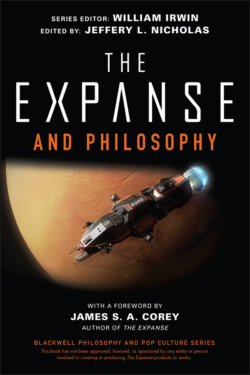Читать книгу The Expanse and Philosophy - Группа авторов - Страница 32
Colonizing the System
ОглавлениеThe very first words of The Expanse appear on a title card: In the twenty‐third century, humans have colonized the solar system. In addition to the 30 billion humans on Earth, 1 billion people inhabit its moon, and another 10 billion live on its former colony, Mars. Furthermore, tens of millions of humans live among the Outer Planets, comprising asteroids between Mars and Jupiter and a number of the moons, like Ganymede, of the outer giant planets.
Human colonization of the solar system is a shopworn trope in science fiction—so much so that we might not give it a second thought. Yet, that would be a mistake. Understating the overwhelming importance of expanding beyond our home planet is easy.
Start by considering Derek Parfit’s (1942–2017) famous thought experiment:
Compare three outcomes:
1 Peace.
2 A nuclear war that kills 99 percent of the world’s existing population.
3 A nuclear war that kills 100 percent.
Obviously, (1) is the best outcome, and (3) is the worst outcome, with (2) sitting between them. However, as great philosophers often do, Parfit pushes past the obvious truth and discovers insights hiding just out of view.
“Most people believe that the greater difference is between (1) and (2), but I believe that the difference between (2) and (3) is much greater. The Earth will remain habitable for at least another billion years. Civilization began only a few thousand years ago. If we do not destroy humankind, these few thousand years may be only a tiny fraction of the whole of civilized human history. The difference between (2) and (3) may thus be the difference between this tiny fraction and all of the rest of this history. If we compare this possible history to a day, what has occurred so far is only a fraction of a second.”1 One of Parfit’s main insights is that the future has the potential to contain vastly more value than the present. (We’ll return to Parfit’s other main insight later in this chapter.)
Toby Ord, a philosopher at Oxford, expands on Parfit’s thinking. “If all goes well, human history is just beginning. Humanity is about two‐hundred‐thousand years old. But the Earth will remain habitable for hundreds of millions more—enough time for millions of future generations; enough to end disease, poverty, and injustice forever; enough to create heights of flourishing unimaginable today.”2 On this quite reasonable assumption about the habitability of Earth, our planet could support an upper bound of 1016 human lives of normal duration over a billion years. More than 1 million times as many humans as exist today could exist in the future, and at least ten thousand times as many humans as have ever existed.
Nevertheless, as good as this earthbound possible future would be, humanity has another possible future that is many, many orders of magnitude better. This possible future is one in which we expand far beyond the bounds of our solar system. Ord gives us a glimpse of this possible future: “if we could learn to reach out further into the cosmos, we could have more time yet: trillions of years, to explore billions of worlds. Such a lifespan places present‐day humanity in its earliest infancy. A vast and extraordinary adulthood awaits.”3 Expanding beyond our solar system could allow humanity and its descendants somewhere between 1034 and 1071 lives of normal duration.4
In other words, failing to colonize our solar system, the Milky Way galaxy, and perhaps even the Virgo Supercluster could cost the future between 1018 and 1055 human lives.
These numbers are so immense as to defy understanding. Here is one provocative way of thinking about the matter. The worst disaster in human history so far has been World War II, which cost about 50 million human lives over six years. Sticking to conservative estimates, failing to colonize the Milky Way would be worse—one hundred trillion times worse. Put somewhat differently, the loss would be approximately equivalent to one World War II every second from 1200 BCE (at the time of the Late Bronze‐Age Collapse, the writing of the Rigveda, and the zenith of the Shang Dynasty) to our own present day.
A moment ago, we noted that it is easy to understate the importance of humanity’s ability in The Expanse to travel across and colonize the solar system. Now we can see why. Moving beyond the confines of the Earth is the first step toward achieving humanity’s interstellar potential, what Max Tegmark, a physicist at MIT, has called our “unlimited cosmic endowment.”5
